When you travel by RV, you often have to choose whether you want to empty the fridge or run the propane while driving so food doesn’t spoil on the journey.
However, there’s always a hot debate about whether running propane to keep food cold while driving an RV is legal and safe. The legality of operating a motorhome, travel trailer, or fifth wheel while the propane is on varies from state to state, but most allow it.
The real concern is how safe it is and what you can do to lessen the danger. There are also tricks expert RVers use to keep food inside the fridge cold so you don’t have to run the propane.
Here’s all you need to know about state laws regarding driving a recreational vehicle while the propane is on and tips to get you to your destination safely without worrying your food will go bad!
Is It Safe to Drive an RV While Using Propane?
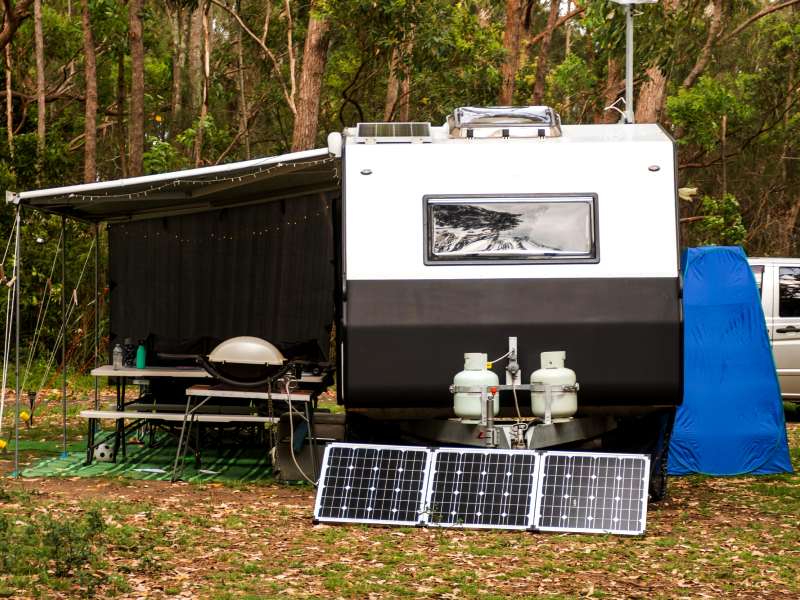
Many people believe it’s dangerous to drive an RV while the propane (LP) is running, and with good reason.
There’s always a chance flammable LP gas could leak from a faulty appliance or damaged lines. A tiny spark from the spinning metal components from the RV suspension system or excessive heat buildup inside the camper box could ignite the pooling gas and cause a devastating fire.
The danger increases when you run the propane while towing a travel trailer or fifth wheel, as you won’t be aware of a leak when you and your guests are driving in the truck or other tow vehicle.
The trailer could fill up with leaking propane gas during a road trip, and opening the door when you want to pop inside the camper at a rest stop could spark a fire or explosion.
In a motorhome, a leaking propane line should trigger the propane gas detector to alarm, allowing you to pull over quickly and shut off the gas before a serious accident occurs. It’s important to distinguish between different types of detectors: a propane gas detector is specifically designed to sense propane leaks, while a carbon monoxide (CO) detector is designed to alarm when CO levels, typically produced from incomplete combustion, reach dangerous levels. For comprehensive safety, it’s advisable to have both types of detectors installed in a motorhome: a propane detector to alert you to propane gas leaks and a CO detector to warn you of carbon monoxide buildup.
It’s also possible a road accident of no fault of your own could trigger a large blaze if the propane is running while a car impacts your RV.
However, the reality of running the propane while driving is that it’s rare for any of the above scenarios to occur.
In my experience, I’ve never known or heard of anyone having an issue letting the RV propane system stay on while driving.
The worst thing I hear is that the propane tank runs out, leaving the RVer in search of a store or campground where they can refill the tank so they can continue on their way.
While I never run the propane during travel in my motorhome, it’s not because I fear a leak. Instead, it’s because my travel style only requires short stretches between plugging into shore power, and I can easily keep my fridge contents cold for eight hours or more by following a few tips.
Your comfort level and RVing needs should determine whether you run the propane when driving through states that allow you to do so.
What RV Appliances Run On Propane?
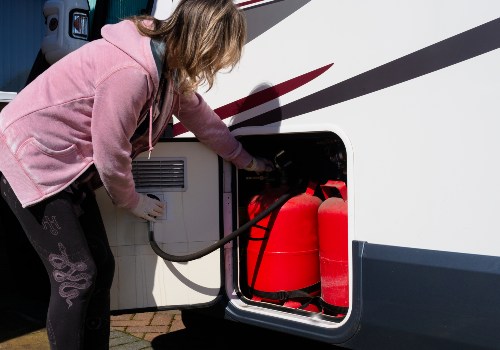
Keeping the propane on while driving your recreational vehicle will allow you to use these appliances when you stop for rest breaks:
- Refrigerator (if you have a dual-power RV fridge that runs off propane and 110v)
- Stove Burners and Oven
- Water Heater
- Furnace
States Where It’s Illegal to Drive an RV With Propane On
This list will be short and sweet, as the idea that you cannot legally operate an RV in the US with the propane running is a myth.
The list isn’t a state-wide ban, but specific roadways where open propane tanks are prohibited.
Here are the states and roadways where driving a recreational vehicle with propane valves open is illegal:
- Alabama: Cannot travel through tunnels with “No Propane” or “No Open Propane Tank” signage
- Maryland: You cannot travel through tunnels on any roadway with propane on
- Massachusetts Turnpike Authority: No Propane of any kind at any time, including on RVs, through the tunnels. RVs must find an alternate route.
- Washington: You must shut off propane when on ferries
- Virginia: No travel through tunnels with propane tanks open
- Texas: the Washburn Tunnel in Houston requires that all propane tanks be closed
These US states indicate specific laws about propane running during travel, and most pertain to if your RV needs to pass through a tunnel. Unfortunately, no other states or regions post easy-to-find data on regulations for driving an RV with propane tanks open.
There needs to be more clarity on this topic, as plenty of contributors to RV forums will say they took their RV through this or that tunnel with the propane on with no one stopping them or checking their propane tank status.
Many states may have local restrictions along certain roadways but will post signs regarding the need to turn off propane tanks (and may even offer a pull-off area to stop your RV) before you reach the restricted zone.
Other regional roadways may post signs that forbid flammable or dangerous materials to pass, and you’ll need to find an alternate route for your RV.
However, in some regions of Canada, it is illegal to use propane while an RV is in motion. So please do your due diligence before traveling through Canada to avoid violating the law.
Gas Station Propane Safety
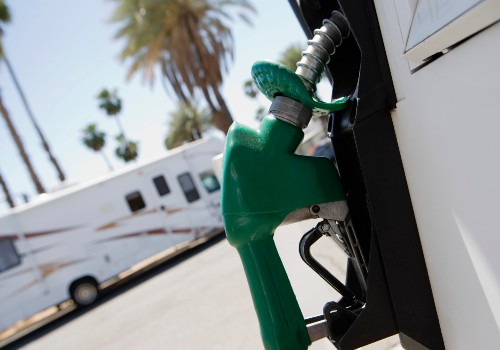
There is one place where you should always close your RV propane tanks during travel: a gas station. The combination of propane and gasoline fumes is dangerous.
Always stop your RV away from the fueling pumps and shut off your propane system before gassing up.
Tips to Keep Your RV Refrigerator Cold Without Propane While Driving
On an RV trip, moving food from the RV fridge to a cooler full of ice and back again once you plug in at a new campground can be a nuisance.
Keeping your food fresh is critical, but you don’t have to bother with this routine if you’re not traveling long distances.
You will need to test your RV fridge to see how long it can remain cold so food stays at a safe temperature. Purchase an easy-to-read digital thermometer to test the temp of items inside the fridge as you go through the testing process.
The best way to test your RV fridge’s coldness parameters is to fill about four to six jugs with water, put them inside, and let the refrigerator run at a cooling level of 37 degrees Fahrenheit until the water is as cold as the fridge setting. Then, use the thermometer to double-check the temp of the water to ensure it’s as cold as the refrigerator setting.
Now, you need to note the time and turn off the power to the RV fridge. You should wait about three hours before opening the refrigerator and quickly testing the temperature of the water.
If the water is within the safe level for foodstuffs, which is 40 degrees Fahrenheit or below, shut the door, wait another 30-60 minutes, and test again.
Want to Connect With a Community of Over 1,078 RV Enthusiasts?
Once the water hits 40 degrees, note the time, which will give you a baseline of how well your RV fridge insulates food. The outdoor temperature will affect the results of this test, but try to perform it during the time of year you camp the most.
Now that you know how long your fridge can stay safely cold when the power is off, you can use the tips below to extend that time by one or more hours.
Pack the Fridge with Food and Lower the Temp
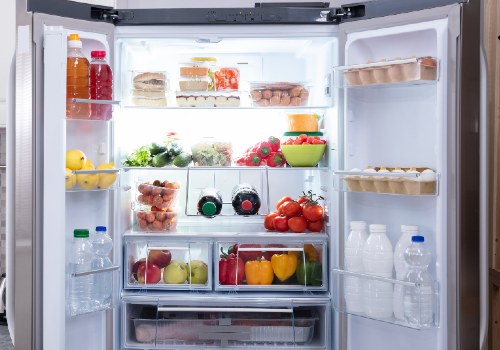
The more food you have inside your fridge, the longer it will remain cold when the power goes off. So when I know it’s time to travel, I will fill up empty spaces with jugs of cold or frozen water I prep for this task.
Lower the temperature setting on the fridge as low as you can without freezing any delicate food items. For example, dropping from a standard 37 degrees to 34 or 33 degrees will help keep all the food colder longer.
Before cutting power, I’ll move all the items from my freezer into the refrigerator to double up on the cooling effort.
Do lay down a clean, dry towel at the bottom of the fridge to absorb condensation as the food begins to warm.
Run a Fan inside the RV Fridge
- HIGH POWER 3,000 R/M MOTOR AND DURABLE CONSTRUCTION – PATENT PENDING…
- LIFETIME WARRANTY AND USA BASED CUSTOMER SERVICE – If the fan ever…
- PROPRIETARY SPRIDERWEB TOP NEW FOR MORE AIRFLOW – We listened and have…
- EASY TO USE ON AND OFF SWITCH – Simply click on the fan when you want…
- ESSENTIAL ACCESSORY FOR ANY RV’er – RV refrigerator are notorious for…
Pick up one or two rechargeable or battery-operated fridge fans at Amazon or any Camping World or RV supply store. Placing the fans inside before shutting the door will help maintain a more even temperature while you drive to reduce the chance of food in some areas getting too warm and spoiling.
Keep the Door Shut
Do not open the door, even to grab a quick snack when driving. If you plan to travel a distance and want a drink or bite to eat, prep a small cooler so you can keep most of your food cold in the fridge.
Standard-size RV refrigerators have a good deal of insulation and should only lose around four or five degrees over eight hours. If you can close your fridge when the internal temperature is at 35 degrees, you should be able to drive for at least six hours and keep food safe if you never open the door.
To ensure the RV fridge door doesn’t pop open during travel, install adjustable shelf bars that use tension to hold food items in place and use a door lock or duct tape to secure the door shut.
Run a Generator or Turn on Propane during Rest Stops
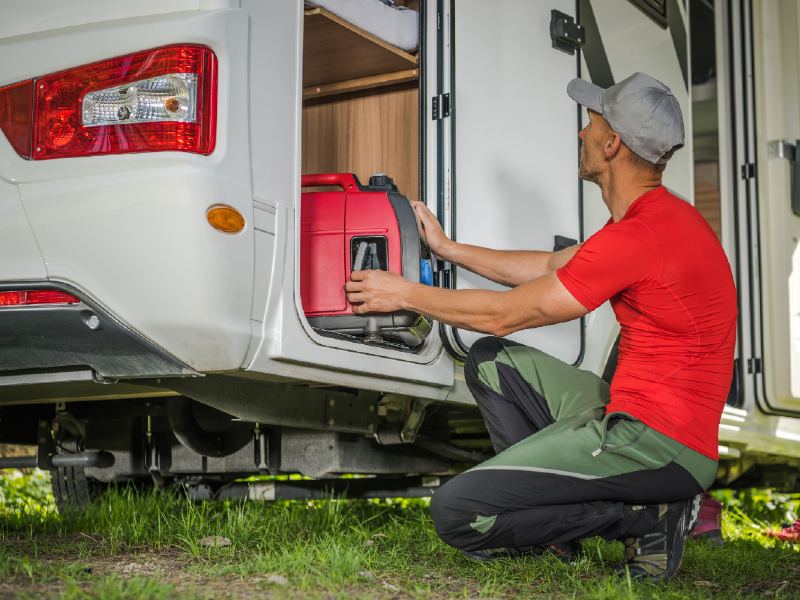
If you stop for extended periods for a break, running an RV generator or propane can cool down the refrigerator contents and give you more travel time before the food goes bad.
Watch the Sun
When you stop for rest breaks, park your RV where the sun isn’t beating on the side of the camper where the refrigerator sits. Any assistance you can give your fridge to stay cooler will help.
Final Thoughts
Most RVers like having the option of running their propane while driving to keep food cold without worrying they are breaking the law.
Knowing that it isn’t illegal to drive an RV while running propane on most roadways across the US is reassuring, as long as you abide by the laws for tunnels, ferries, or other local restrictions.
While everyone can agree that it’s always safest to turn off RV propane while driving if you don’t need it, there’s no evidence that keeping it on is overtly dangerous. This guide highlights the realities of the laws about driving with your propane running, and you use the information to enjoy stress-free RVing adventures!
Is It Safe to Drive with Your Propane On? (Video)
"Man cannot discover new oceans unless he has the courage to lose sight of the shore."
-- Andre Gide

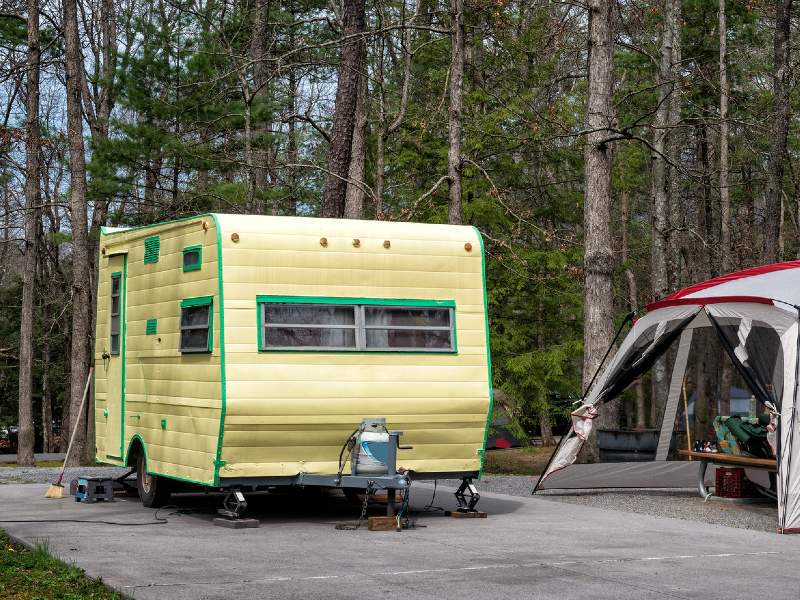

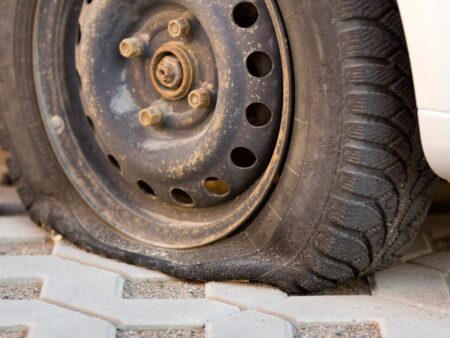

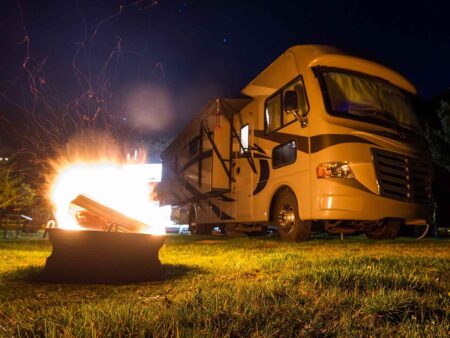
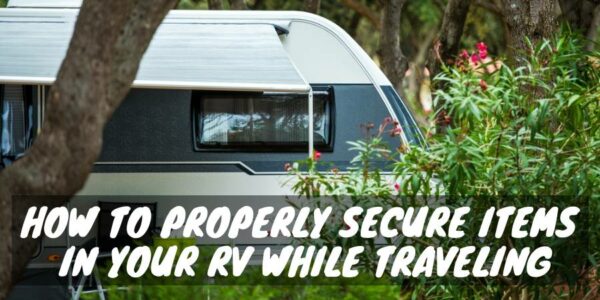
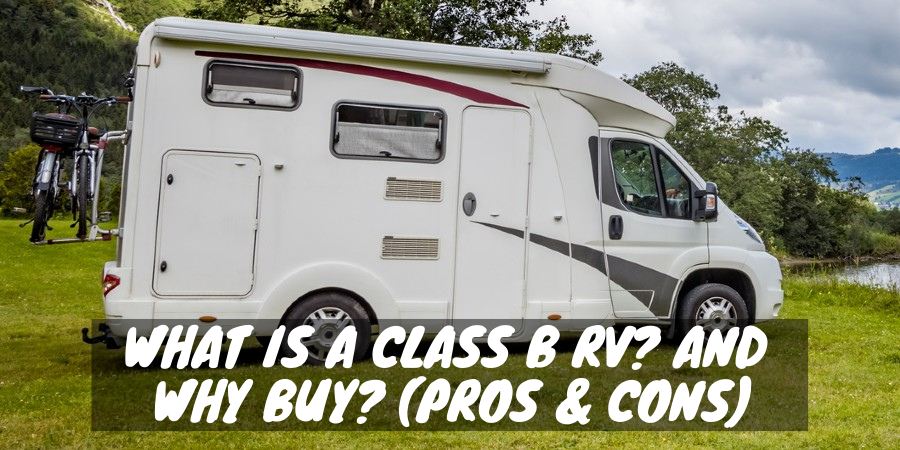


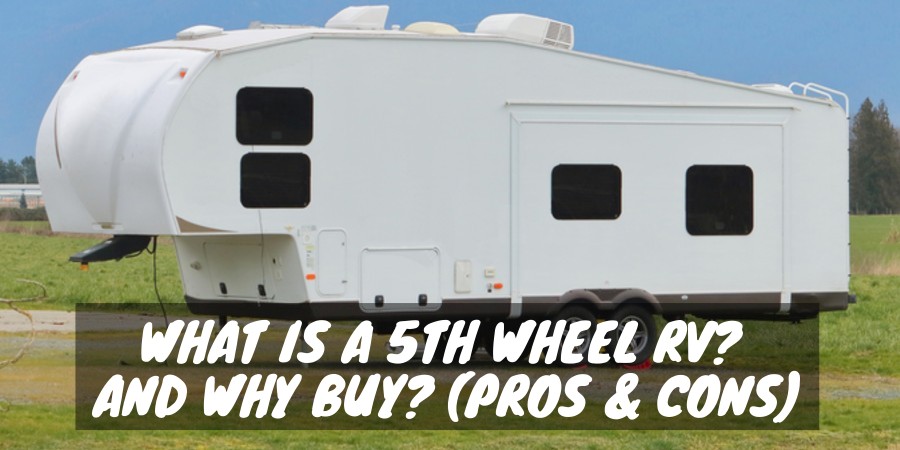
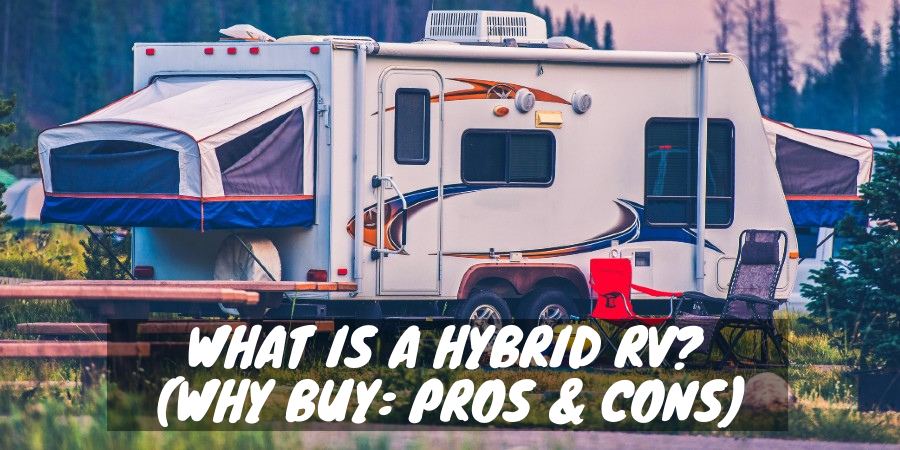
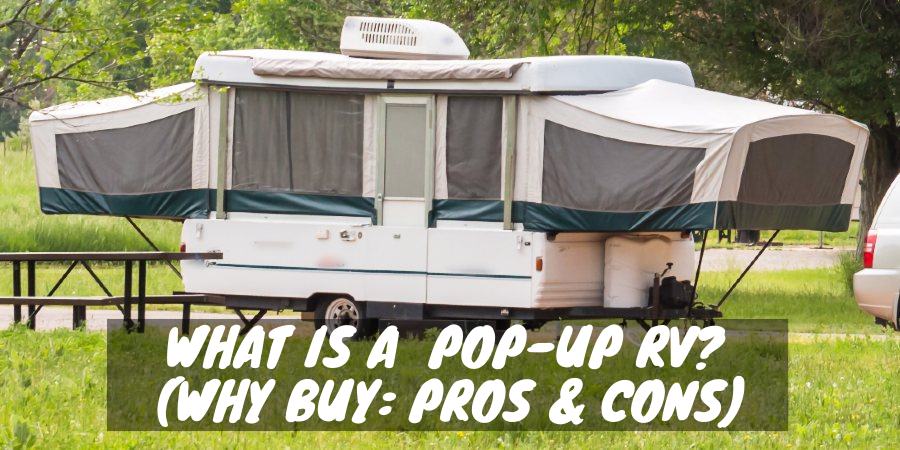
A CO detector won’t detect propane gas unless it’s a combination CO/propane gas unit. Our class B Four Winds Siesta has both a propane sniffer alarm and a separate CO detector alarm.